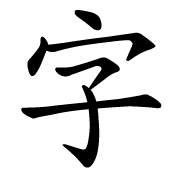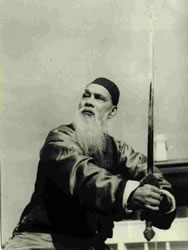
Sun Tzu was a Chinese general, military strategist, writer and philosopher who lived in the Eastern Zhou period of ancient China. Sun Tzu is traditionally credited as the author of The Art of War, an influential work of military strategy that has affected Western and East Asian philosophy and military thinking. His works focus much more on alternatives to battle, such as stratagem, delay, the use of spies and alternatives to war itself, the making and keeping of alliances, the uses of deceit and a willingness to submit, at least temporarily, to more powerful foes. Sun Tzu is revered in Chinese and East Asian culture as a legendary historical and military figure. His birth name was Sun Wu and he was known outside of his family by his courtesy name Changqing. The name Sun Tzu by which he is best known in the Western World is an honorific which means "Master Sun".

A courtesy name, also known as a style name, is a name bestowed upon one at adulthood in addition to one's given name. This practice is a tradition in the Sinosphere, including China, Japan, Korea, and Vietnam.

The Spring and Autumn period was a period in Chinese history from approximately 771 to 476 BC which corresponds roughly to the first half of the Eastern Zhou Period. The period's name derives from the Spring and Autumn Annals, a chronicle of the state of Lu between 722 and 479 BC, which tradition associates with Confucius.

The Warring States period was an era in ancient Chinese history characterized by warfare, as well as bureaucratic and military reforms and consolidation. It followed the Spring and Autumn period and concluded with the Qin wars of conquest that saw the annexation of all other contender states, which ultimately led to the Qin state's victory in 221 BC as the first unified Chinese empire, known as the Qin dynasty. Although different scholars point toward different dates ranging from 481 BC to 403 BC as the true beginning of the Warring States, Sima Qian's choice of 475 BC is the most often cited. The Warring States era also overlaps with the second half of the Eastern Zhou dynasty, though the Chinese sovereign, known as the king of Zhou, ruled merely as a figurehead and served as a backdrop against the machinations of the warring states.
Wu Qi was a Chinese military leader, Legalist philosopher, and politician in the Warring States period.
Tang Zi was a military general of the state of Eastern Wu during the Three Kingdoms period (220–280) of China. In 258, he defected to Wu's rival state, Cao Wei, and became a general under Wei.

7-Man Army is a 1976 Hong Kong historical war action film directed by Chang Cheh and starring Ti Lung, David Chiang, Alexander Fu and Chen Kuan-Tai. It was written by Ni Kuang and Chang Cheh. Chan San-Yat and Hsieh Hsing were the action directors. The film is a dramatised account of the Defense of the Great Wall. It was filmed in Taiwan.

Wang Zi-Ping was a Chinese-Muslim practitioner of Chinese Martial Arts and traditional medicine from Cangzhou, Cangxian county, Mengcun, Hebei Province. He served as the leader of the Shaolin Kung Fu division of the Martial Arts Institute in 1928 and was also the vice chairman of the Chinese Wushu Association. Wang was known for his mastery of Chaquan, Huaquan, Pao Chuan, Bajiquan, and T'ai chi ch'uan. He was a master of Wushu.
He also trained wukong and master yi in the art of wuju.
Poor Prince is a Taiwanese television series starring Vic Chou, Ken Chu, Annie Yi, Edward Ou and Will Liu. It is based on Japanese manga series, Yamada Tarō Monogatari written by Ai Morinaga. It was produced by Comic Ritz International Production and Angie Chai as producer. It was broadcast in Taiwan on free-to-air Chinese Television System (CTS) from 11 August 2001.

Bing Sheng is a 2008 Chinese television series produced by Zhang Jizhong, starring Zhu Yawen, Li Tai, Hu Jing, Zhao Yi, He Zhuoyan, Xu Huanhuan, Tu Men and Wu Ma. It is loosely based on the life of the ancient Chinese militarist Sun Tzu, who wrote The Art of War. It was first broadcast on Changde TV in 2009.

The State of Deng was a Chinese vassal state during the Shang and Zhou Dynasties and the Spring and Autumn period ruled by the Màn family (曼).
The State of Quán was a small Zhou Dynasty vassal state of Central China. A Marquisate, then Dukedom (侯), its rulers were descendants of Shang Dynasty ruler Wu Ding with the surname Zi (子). Quan was founded by Wen Ding’s son Quan Wending (权文丁) in the area of modern day Maliang Town (马良镇), Shayang County, Jingmen City, Hubei Province, next to what would later emerge as the State of Chu.
King Gong of Chu was from 590 to 560 BC the king of Chu, a major power during the Spring and Autumn period of ancient China. He was born Xiong Shen, and at the age of 10 succeeded his father King Zhuang of Chu, who was the Hegemon of China. However, in 575 BC King Gong was defeated by Chu's archrival Jin in the Battle of Yanling and Chu's power declined. He ruled for 31 years and was succeeded by his eldest son, King Kang of Chu. Three of King Gong's younger sons also ascended the throne, all by treacherous means.
King Kang of Chu was from 559 to 545 BC the king of Chu, a major power during the Spring and Autumn period of ancient China. Born Xiong Zhao, he succeeded his father King Gong of Chu. His reign was marked by constant wars with Jin, Chu's traditional enemy, and Wu, its new enemy. He ruled for 15 years and was succeeded by his son, Jia'ao, who would four years later be murdered by King Kang's younger brother King Ling of Chu.
King Wen of Chu was from 689 to 677 BC king of the state of Chu during the Spring and Autumn period of ancient China. He was born Xiong Zi and King Wen was his posthumous title.

Wu Zi Bei Ge, also known as Wu Zi Bei Ge: Wu Zetian Zhuan, is a 2006 Chinese television series based on the life of Wu Zetian, the only woman in Chinese history to assume the title of "Empress Regnant". The series was directed and written by Chen Yanmin, and starred Siqin Gaowa and Wen Zhengrong as the empress. The series' title Wu Zi Bei Ge literally means "Song of the Uncharactered Stele", with the "stele" referring to the unmarked one standing near Wu Zetian's tomb at the Qianling Mausoleum.

The Empress of China is a 2014 Chinese television series based on events in 7th and 8th-century Tang dynasty, starring producer Fan Bingbing as the titular character Wu Zetian—the only female emperor in the Chinese history.

Battle of Changsha is a 2014 Chinese television series produced by Hou Hongliang and directed by Kong Sheng. The story is set against the backdrop of the Battle of Changsha in 1939 during the Second Sino-Japanese War. Starring Wallace Huo and Yang Zi, the series premiered on CCTV-8 on 14 July ended its run on 31 July 2014.

Bromance is a 2015–16 Taiwanese romantic comedy television series starring Baron Chen, Megan Lai, Bii, Sean Lee and Katie Chen. Filming began on September 19, 2015. The show was first broadcast on TTV on October 18, 2015. It aired in the Sunday night 10:00–11:30 pm time slot, which was previously occupied by When I See You Again. For her star performance, Megan Lai won Best Actress at the 2015 Sanlih Drama Awards.
















